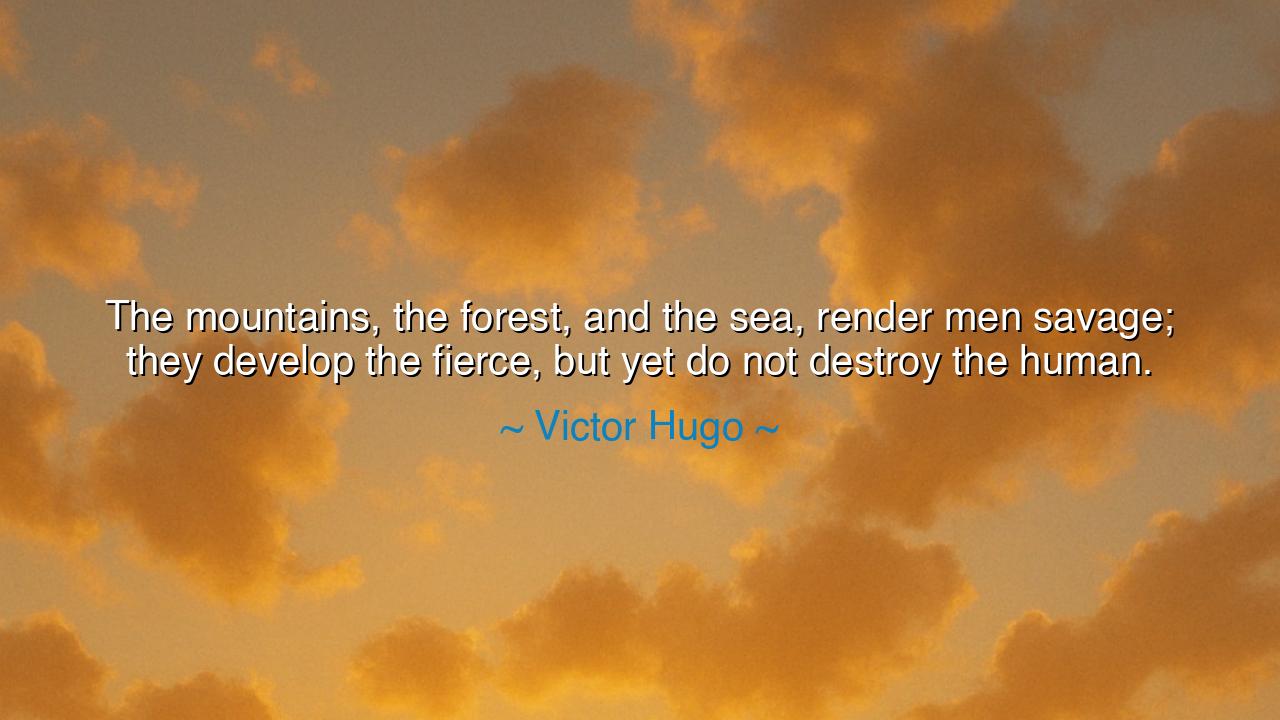
The mountains, the forest, and the sea, render men savage; they
The mountains, the forest, and the sea, render men savage; they develop the fierce, but yet do not destroy the human.






Victor Hugo, seer of humanity’s depths and prophet of its grandeur, once declared: “The mountains, the forest, and the sea, render men savage; they develop the fierce, but yet do not destroy the human.” These words hold within them the thunder of the earth itself. For Hugo perceived that the natural world, in its raw and untamed majesty, awakens in man a primal fire. It strips away softness, it hardens resolve, it forces him into struggle with the elements—but it never erases the spark of his humanity.
The meaning of this saying is clear: to dwell close to the elemental forces of nature is to be shaped by them. The mountains demand endurance, the forest demands vigilance, the sea demands both courage and humility. These forces roughen men, sharpening their instincts, teaching them to fight, to endure, to survive. Yet even in this process of becoming “savage,” man retains his essence. Beneath the fierce exterior, the human remains: capable of love, of wonder, of kinship. Nature strengthens the body and spirit, but it does not strip away the soul.
The origin of Hugo’s thought is found in his deep Romantic vision of the world. He saw nature not as a gentle ornament, but as a force that dwarfs men and yet uplifts them. In his novels, the stormy sea, the dark forest, the towering cliffs are more than settings; they are characters that shape destinies. He believed that to confront the vastness of nature is to awaken parts of the self that civilization lulls to sleep. One becomes “savage” not in cruelty, but in intensity—fierce, raw, alive.
History bears witness to this truth. Consider the Vikings, who braved the northern seas in fragile ships. The ocean hardened them, made them bold raiders and explorers, men whom others called savage. And yet, among themselves, they sang poems, carved runes, honored their families, and dreamed of Valhalla. The sea gave them ferocity, but it did not strip them of the human—it deepened it. Or think of the highland clans of Scotland, hardened by the mountains, fierce in battle, yet deeply bound to kin, song, and story. Their savagery and their humanity lived side by side.
This duality is not a contradiction, but a harmony. Civilization often seeks to tame men, to smooth them, to make them gentle. Yet Hugo reminds us that fierceness itself is not evil. To be fierce is to be alive, to be sharpened against hardship, to stand upright before the storm. The danger lies not in savagery, but in the loss of the human—the compassion, the wisdom, the inner light that distinguishes man from beast. Nature can test us, batter us, strip us bare, but it does not take away our essence.
O children of tomorrow, take this lesson to heart: do not fear the mountains, the forest, or the sea. Do not fear the hardships that make you fierce. They will temper you, like fire tempers steel. But guard always the human within—the ability to love, to dream, to serve. For what is strength without mercy? What is ferocity without compassion? The world needs men and women who are both savage in endurance and tender in soul.
Therefore, the teaching is clear: seek out the challenges that harden you, but never surrender the core of your humanity. Climb the mountains that exhaust you, walk the forests that test your solitude, sail the seas that humble your pride. Let them awaken your strength, but let them never extinguish your light. For the greatest man is not the one untouched by savagery, but the one who endures it, masters it, and still remains human.
Thus Hugo’s words endure as both warning and encouragement: “The mountains, the forest, and the sea, render men savage; they develop the fierce, but yet do not destroy the human.” Take them as a guide: be fierce when the world demands it, but guard the flame of your humanity, for that is the one treasure the storm cannot be allowed to sweep away.






AAdministratorAdministrator
Welcome, honored guests. Please leave a comment, we will respond soon